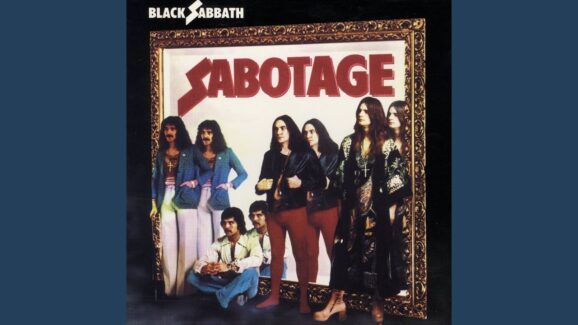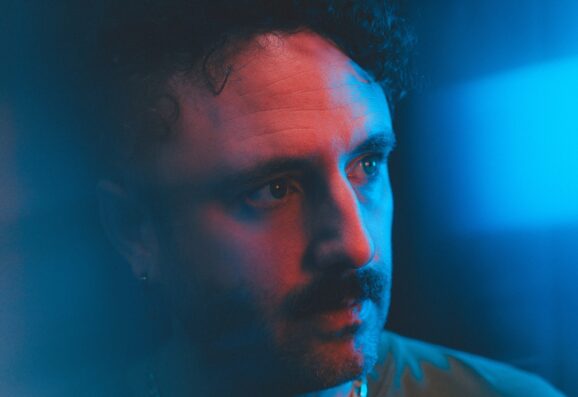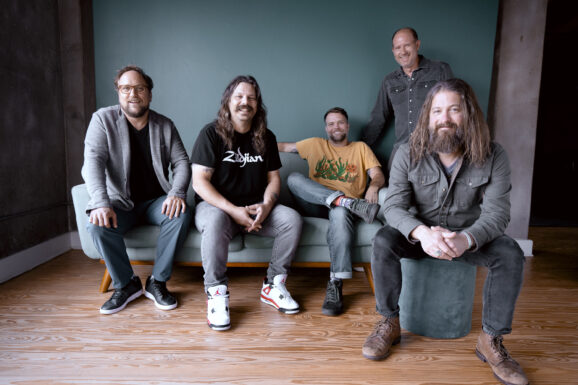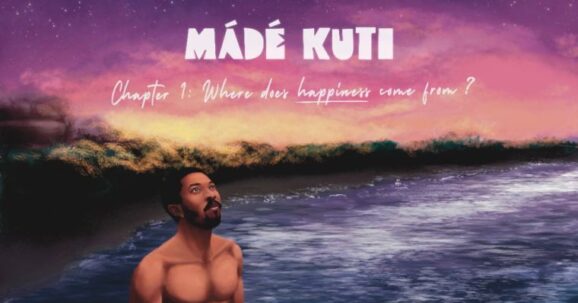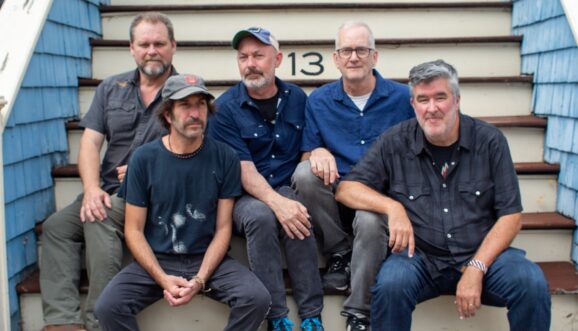Divine Horsemen have recently released Bitter End of a Sweet Night via In The Red Records, a follow-up to 2021’s Hot Rise of an Ice Cream Phoenix that marked their return to releasing music after 33 years. In many ways, it was like no time had passed at all, with new Divine Horsemen songs proving just as challenging and interesting as their original raft of releases. Likewise their approach to making cover songs their own, carefully chosen for sound and content.
The new 16-track collection, which has also arrived in double LP format, again features the band’s co-founding members, singers-songwriters Chris Desjardins, also known as Chris D., and Julie Christensen. Both artists contributed songs to the album and also brought in cover songs that sparked their enthusiasm. Overall, Bitter End of a Sweet Night takes us into a little more psychedelic territory at times, all while continuing to deliver an emotional punch unique to the dual vocals that Divine Horsemen employ. I spoke with Julie Christensen about the return of Divine Horsemen and how this new record came about in comparison to Hot Rise. We also spoke about the intersections between Americana music and Punk music and why the diversity in genres that we see now may well reflect the aims of many bands in Divine Horsemen’s original milieu.
Hannah Means-Shannon: Though I spoke with Chris about your previous album, a return for Divine Horsemen, but I’ve never gotten a chance to ask you about what was on your mind for Hot Rise of an Ice Cream Phoenix. Was that a shift to be working on new music under that umbrella again?
Julie Christensen: Around 2018, I worked on Chris’ Flesh Eaters’ “I Used To Be Pretty”, but even before that time, I’d mentioned to Chris a few times over the years, “Why don’t we do some Divine Horsemen again? Wouldn’t that be a kick?” A psychic in Nashville told me “Somebody in town’s going to pay a lot of attention to you, but you have to get your old band together first.” [Laughs] I was skeptical. Then, in 2018, when we worked on the Flesh Eaters thing, we walked about some dates as Divine Horsemen even though we didn’t have a record. It was hard to get booked since it had been so long. We also lost our longtime bass player Robin on the eve of trying to do some dates and having a few booked. That was really tragic. But we still talked about getting together, and I did about five dates with The Flesh Eaters since they needed some estrogen in the mix.
But then we started to talk in earnest and Chris started writing with Peter, and I started keeping my ears open for some possible covers that we could do. It was towards the end of the process of gathering the songs that Chris sent me some songs to help him write them. I wrote the music to “Barefoot in the Streets.” That was really fun. It’s always nice to have homework when I’m writing. I play the guitar, but I play it in the DADGAG tuning to make it easy to accompany myself. I was over 50 when I started picking up the guitar again and so I came up with a way of writing that freed me up to do that.
I’ve now moved to New Mexico, but in 2019, I was coming out to LA from Nashville to rehearse. And then we pretty much started recording live. That’s something that Chris has always done with bands. We rehearse the hell out of it first, so it sounds like we’ve been out on tour before we do it. I also brought in that song “Any Day Now” from my Knoxville friends Bark, with Tim and Susan of the Tim Lee 3. When we had a co-bill in Nashville once, he and Susan told me that whenever they are in thrift stores and see an old Divine Horsemen album, they buy it and share it with people. We got to return the favor with that song.
I love Bark’s songwriting because they allow for inspiration to bring out unusual ideas. I’m sure that you all are the same with your music. There’s everything to be said for working hard on music and lyrics, but I feel like being flexible helps capture bigger ideas and sounds.
Divine Horsemen’s “trip”, since I wouldn’t say “sound”, is a kind of journey people come into when they listen to it. I’ve always felt like that was important. When we were around that whole crowd of people, we all did wildly different things. Gun Club was way different than Green on Red, who was way different from Dream Syndicate.
We were all doing different stuff and Chris and I got compared to X a little bit, but we were very different. We were doing these Gothic murder ballads and rocking them out. There was a weird, swampy, voodoo, Country thing, and our little amalgamation of influences was different than other people. Everyone had their own thing, and the bands were all unique. It wasn’t like, “Americana is the sound and we’ve got to be slavish to that.” There have been some sort of laws about roots music, I feel.
But I’m really thrilled to be doing this again because, all those bands I mentioned, including Peter Case, were kind of granddaddies to a lot of what’s happening in Americana now. At least that’s how I feel.
I feel like I can see a lot of intersections of developing Americana with Punk environments in the past. I think the combinations we’re seeing in Americana right now aren’t necessarily new. Many were there, but were being marginalized at that time.
There you go. I love what’s coming out of Americana. It started out the way I mentioned, but now it’s getting very diverse, musically. It’s less about people trying too hard now. Jimmy Palacios has a thing called “NOLA County Radio” and he was part of “Gimme Country”. Chuck Prophet had a show that was completely oddball, early 60s, Garage stuff. I was one there once. It wasn’t Country, it was this whole broad thing. Jimmy’s “NOLA County Radio” is a go-to for me about what is happening. I first heard Sierra Farrell on his show way before she was well-known.
It’s wonderful to have avenues to discover new music and also for musicians to hear about each other, which leads to collaborations.
We did, back in the day, too, even without social media. People didn’t even take many pictures back then. I think there were just a couple people who took photographs of us. No one was thinking about documenting us, except Allison Anders who did the Border Radio movie. Green on Red says that’s the only home movie they have! It’s in the Criterion Collection now.
What did you think of these new songs when you first started seeing them take shape?
Well, Chris had melody ideas and scratched them out a little bit on the guitar, but Peter really helped realize these, like “Memory Fails” and “Talking in Your Sleep Again”, and “Footprints on the Moon”, which is a Ramons-y kind of thing. “The Garden of Night” song was a lyric from Erika Ware. “Dirty Like an Angel” is a new original, and “On the Wane” is a Punk-Rock romp. “You Knew No Other Way” is a lot like old Divine Horsemen stuff. It’s epic and anthem-y. Then, Chris sent me the lyrics to “Bitter End” and “Notorious”, and I wrote the music to them, the melody and the harmony.
I was working on those in New Mexico, since I moved in the middle of the pandemic, also in the middle of making my Kevin Gordon album [11 from Kevin], which I’m very proud of. But my Cardinal record, by the way, came about because I missed doing Rock the way we did in Divine Horsemen. It’s very much a homage to Divine Horsemen.
I’m reminded of how many genres you’ve worked in, including Jazz. We see so many of those influences on this album. Does it mean something to you, personally, to be able to work in so many genres at will?
Yes, I think it keeps me sharp. [Laughs] Well, sharp enough. I joke to my son that I’m an elder now. But I think it does keep me sharp, since I just did a gig with a big band. I did the Anita O’Day tunes for a Gene Krupa tribute with a nine-piece horn band. That was really fun. On those kind of things, if you miss your entrance or exit, you have to go miles to get back, so you have to stand and deliver.
That’s intense! Especially if it’s not something that you do every day. Do you have to condition yourself into things that you haven’t done in a while? Is that what the rehearsals are like before recording with Divine Horsemen?
Well, yes. I’m doing that with Divine Horsemen, too. It is intense, it’s like an athletic event. Especially if they’ve been rehearsing for a couple of months without me. We have a great drummer now, since DJ can’t do the live stuff, even though he does the record with us. He has a lot of dynamic sense. But the songs from back in the day that we’re doing live are in the same key that we were doing then! I have to really look at the performances as an athletic event. I’ve been rehearsing on my own, then this week we’re going to play the tunes and set for our November performance.
That’s wonderful that you have performance plans for this record.
We’re really only doing a few of the songs from this record, then we’re doing some songs from Hot Rise, then we’re doing a bunch of stuff from the olden days.
It’s admirable that you aren’t cutting yourself any slack and performing the old songs with the same vocal delivery. But given what I’ve heard, I think the older music and the two newer albums must go together very well in a set.
Oh, it really does! When the band’s rehearsing, they are really tight. It’s going to be so much fun.
This music is fun, and energetic, and introduces many ideas. I think a lot of the ideas that come up in the songs feel relevant right now, too.
JC: Chris doesn’t necessarily try to be topical, but I think it’s a kind of worldview that’s unique. The covers that we picked, like “It’s Still Nowhere” is one of my favorite ones on the record, it’s so psychedelic. Also, “Next Man That I see,” where I do a talking part. A couple of people who I co-wrote with, unfortunately, are no longer around. David Olney was someone I wrote the “No Mercy” song with, him and John Hadley. The song was one of the jumping-off places for that Cardinal record of mine, so I thought it would work for this record.
That song really struck me. It feels recognizable. As the song says, “nothing sacred, nothing profane” is not a good state of being. It’s a version of reality we see but don’t want.
I think that kind of stuff is relevant anytime when you’re talking about the way that people treat each other and the way that we’re fed information.
Absolutely. I think that pointing it out is never out of fashion, either.

